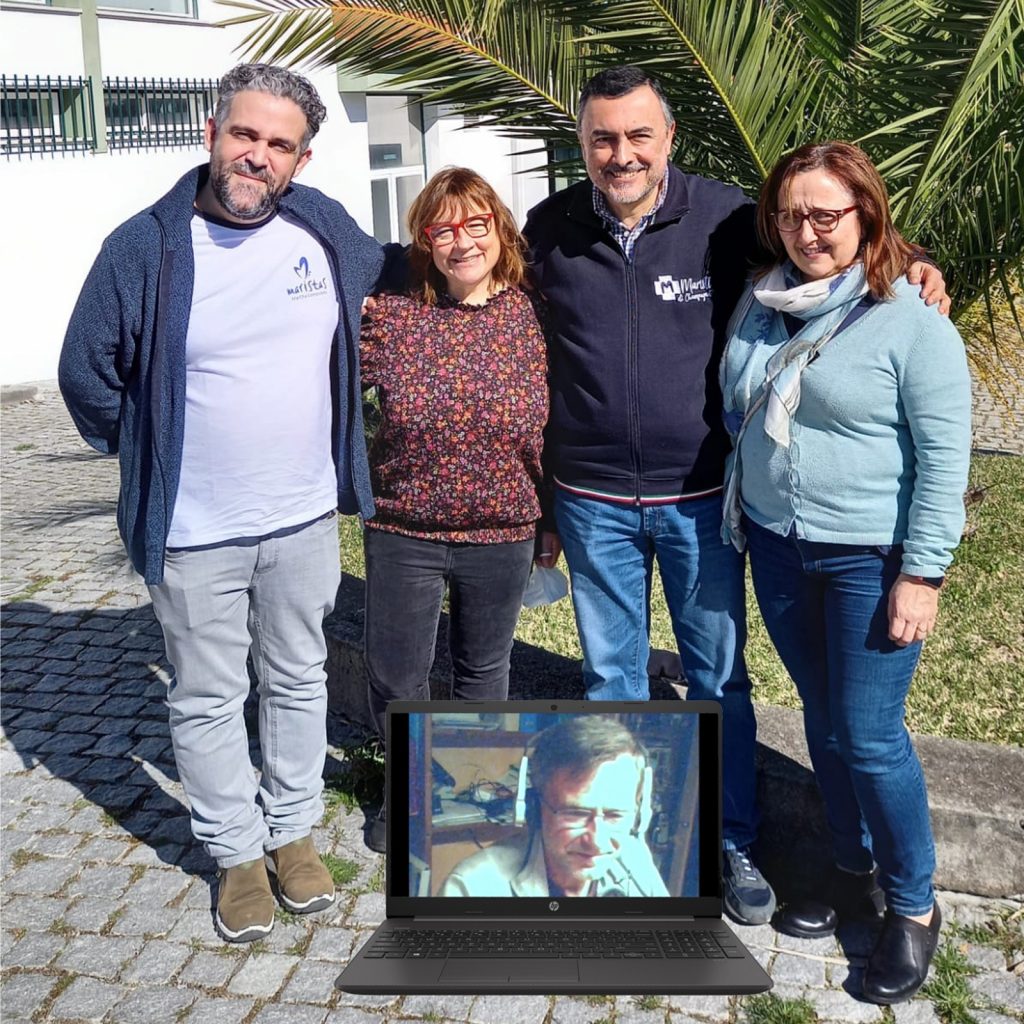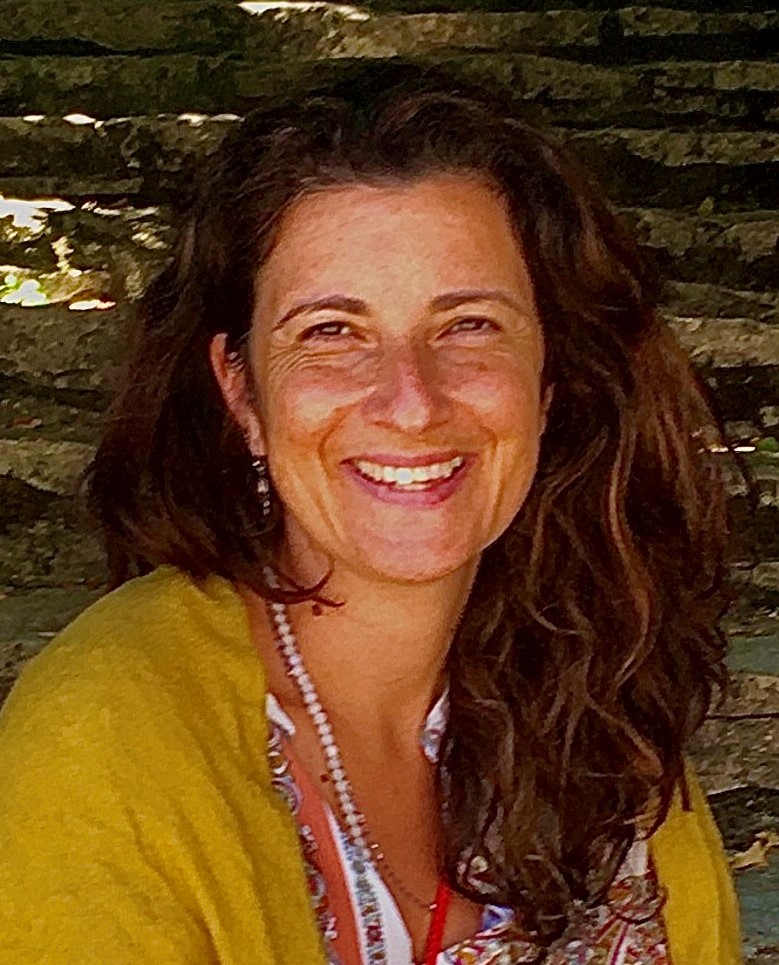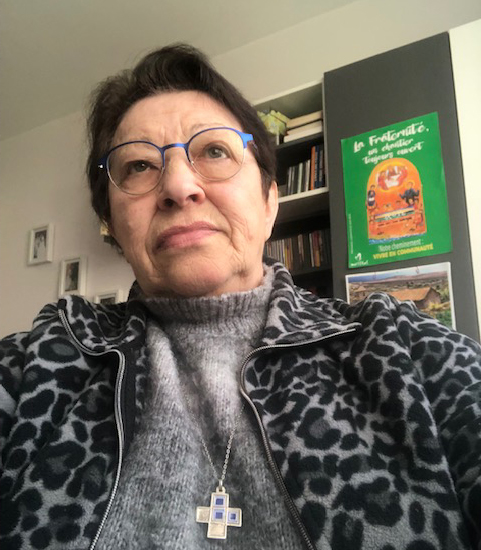Sharing 11 – The Lay Marist Vocation
Download: English | Español | Français | Português
LOOKING BEYOND
In this month of March, the General Conference of the Marist Institute is being held in Rome. This is a consultative assembly composed of the Superior General and his Council, the Provincials and District Superiors. It is convened between two General Chapters with two objectives: to consolidate unity within the Institute and to study matters of general interest in order to propose ways forward.
This year 2022, the General Conference is taking “Looking beyond” as its theme, words that inspired the message of Br Ernesto on 6 June 2021. This invitation is also a call to the Marists of Champagnat, and especially to the lay men and women of our region of Europe.
Even as these lines are being written, we are living through an experience that we thought we had left behind in the Europe of times past. Russia’s invasion of Ukraine reminds us of that terrible first half of the 20th century when the only two ‘world’ wars so far took place. In this context, “Looking beyond” means welcoming the call of Pope Francis in Fratelli Tutti 127: “We can aspire to a world that provides land, housing and work for all. This is the true path of peace, not the senseless and myopic strategy of sowing fear and mistrust in the face of outside threats. For a real and lasting peace will only be possible “on the basis of a global ethic of solidarity and cooperation in the service of a future shaped by interdependence and shared responsibility in the whole human family”.
It is also the case that in March we celebrate three events with a markedly lay character: International Women’s Day (8 March), St. Joseph’s Day (19 March) and the Annunciation of the Lord (25 March).
A feminist viewpoint encourages us to develop a new sensibility that should lead to fresh pathways that clearly incorporate this perspective. The presence of so many Marist women throughout our world is already shaping a new way of envisaging and incarnating the charism.
Mary and Joseph inspire our following of Jesus as lay women and men. Celebrating these feasts of 19 and 25 March offers us the possibility of continuing to discover how to incarnate our lay vocation in our daily lives: in the world of work, of the family, of prophetic commitment in our particular social context… and to do so from the profound experience of feeling called, as beloved sons and daughters of God, who counts on us to bring out the best in humanity.
In Europe, we lay Marists are committed to responding to several challenges that impel us to “Look beyond”: to strengthen the lay Marist vocation, with common processes and pathways that help us to deepen and grow in our vocation; to take significant steps of communion in a spirit of synodal discernment as urged by Pope Francis; to continue to encourage and welcome the commitment of those who want to express their attachment to the Marist charism in a public way.
And, above all, to carry out the mission to which we feel called by the gift of our lay vocation, being beacons of hope and bridge builders, fostering a culture of encounter and dialogue, committed especially to the causes of those who suffer exclusion in our societies.

European Laity Team: Maye Ballaz (Iberica), Marta Portas (L’Hermitage), Wolfgang Hacker (Central-West Europe), Eladio Díez (Compostela) and Manu Gómez (Mediterranea).
A feminist view of the Marist charism
Silvia Martínez Cano – Province of Iberica
Between Marcellin Champagnat’s time and ours there is not only a large gap in years but also in ways of understanding situations and events around us. Marcellin’s intuition was that to be close to the overlooked people in those troubled times the Little Brothers of Mary had to be an active presence, not only providing comfort but also positive affirmation. This means that presence and care in the Marist charism are accompanied by affirming not only the value of every life, but also of the self-worth and potential of those who have been abandoned or neglected. For me, as a publicly-committed lay Marist, as a theologian and as a woman, the “Montagne experience”, at the distance of two centuries, continues to be central to our understanding of the community and missionary commitment of Marists in the world. The experience of Marcellin with that dying young man is being repeated today in other parts of our world and in other groups who, in similar turbulent times, are crying out to be heard. There are three pressing urgencies in today’s world: poverty, migration, and women. These are the signs of the times for us today. There is a common denominator in all three, namely a patriarchal, hierarchical and authoritarian system that excludes, abuses and subjugates the most vulnerable. But we also note that 70% of the poor and migrants are women and the gap between men and women in the world is widening as we lurch from crisis to crisis. Women are the key to understanding our broken reality. Marcellin’s intuition – to accompany the abandoned – today includes a focus on the lives of the disadvantaged and forgotten women of our planet.
My experience as a lay Marist invites me to direct part of my efforts in Marist mission towards those who can use their vulnerability to empower themselves and transform the world to make it more egalitarian, just and welcoming. In this way, we are taking up another intuition that was present in the early growth of the Institute: the equality that existed between the Little Brothers of Mary – all brothers, all lay people – and those who were the recipients of their mission – again, all brothers and sisters, all lay men and women. To bring this feminist perspective, that is, to bring a perspective of equality in regard to Marist work and life, contributes not only to being more faithful to the origins of the charism, but also to continue to highlight the true meaning of the Gospel: to sit at the same table whether we are free, slaves, men, women, Greeks or Jews (cf. Gal 3,28).
Therefore, a feminist view of the Marist charism is not some add-on or passing fad. It is a contribution that amplifies our experience of faith without deviating one iota from our mission. The contributions that feminism can make to the Marist charism can be expressed in two dimensions of thought and action. The first dimension has to do with Marist life and the other with Marist mission.
A new sensitivity to religious experience
Feminist contributions to Marist life show us a new sensitivity of some women to religious experience and also to their experience of the world. In particular, it reformulates the concept of brotherhood which is at the heart of the Gospel message. Its centrality can be described by two ideas: the first is inclusion and the second is equity. Inclusion can be understood as actions that imitates Jesus’ way of including all those who lived on the margins of society in his mission. The presence of women in the itinerant group of Jesus’ movement (e.g. Mary of Magdala, Joanna the wife of Chuza, and others cf. Lk 8,1-3) and among the disciples who received him in their homes (e.g. Martha and Mary of Bethany cf. Lk 10,38-42), something quite unusual and scandalous at that time, tells us that Jesus did not distinguish between the sexes in his mission. However, in our communities we have an ecclesial structure that for many years has excluded women. Perhaps what the Gospel is asking of us today, through the signs of the times that we can discern, is to generate a set of communities within the wider charismatic community of Marists that are living signs of the real and effective inclusion of men and women as sisters and brothers. This means that, in the way we live and organise ourselves as equals, the first step is to dream together about all these issues and to work out a plan for equal inclusion. Then put it into practice. This will have repercussions not only in regard to daily Marist life and spirituality but also at the institutional level. Today the presence of women in the Institute with voice and vote is not something ‘added on’ but rather a sign of the times that transforms our leadership and support structures to be much more egalitarian. Active and non-condescending inclusion is fundamental to transform the structures of the Institute and to adapt to another ‘epoch’, the word used by Pope Francis.
On the other hand, equity goes beyond equality. In equity we do not only equalise, but we give each person what he or she needs. In this sense, we do not all need the same thing, because we are not in the same place in society. Nor do we have the same opportunities. It is the same in community life. Equity brings that “extra” that many need in order to develop their talents in the community. This can be linked to recognising the value of women’s agency, ideas, actions and spirituality within our Marist communities. Feminist Christian spirituality has long been developing models of caring in community that have close links to our Marist charism. Empathy, mutuality and recognition of the dignity and autonomy of the other are traits we share. Others could easily be incorporated into our charism: the presence of reconciliation processes, communication competence, and inclusive and empowering models of care. Inclusive and empowering would mean that we take special care of those women who are ignored by the community because of their sexual condition and that we accompany them to develop their talents by facing their lives and joining the Christian community on equal terms. Putting this praxis into action would lead us to create and grow as a much more egalitarian community and to be a sign and model for others.
Close relationships and family spirit
The contributions that Christian feminism can make to Marist mission could enhance the charism by bringing a fresh and growing edge to it. The charismatic style that we Marists finds expression especially in close relationships and family spirit. This style connects us to two fundamental elements of the signs of the present times that can improve the mission that we Marists are engaged in today.
On the one hand, we are in a time of prophecy. It is Mary’s prophecy that motivates and urges us on, especially as a congregation. Our way of addressing Mary our Mother today is as the prophetess Mary, Mary of the Magnificat, who is a Mary who dares to cross the threshold forbidden to women – the threshold of the house – and sets out on the road to Ain Karem. ‘Mary going with haste’ is today a Marist invocation in our international, inter-congregational and ad gentes missions. The prophetic voice of Mary announces that those whose lives are circumscribed can have a more liveable life (cf. Lk 1, 39-56).
On the other hand, our family style pays special attention to the quality of our everyday care. Feminist Christian spirituality has interesting insights that can enhance what is already ours. Thinking of caring as a form of mission, not just as an unconscious charismatic trait, helps to ensure healthy and egalitarian relationships between boys and girls, and between women and men, in our formal and non-formal educational and other social settings. We cannot take this for granted in our world, but must foster it day by day through our close relationships and family spirit. The theology of care being developed by feminist theology provides us with some keys for developing the egalitarian character of the education we are offering. Giving importance to active listening, accompaniment and simple relational warmth contribute to an equitable and personalised education that can lead to a different world that is much more egalitarian. In this sense, it is pertinent to raise questions in our ministries related to education for equality, education for diversity, sexual education as fundamental for healthy families, or to design specific educational projects for the promotion of impoverished women, especially young women and girls as is proper to our charism, so that they have a better chance of facing the difficulties that they encounter in social and working life and can confront the glass ceilings and the structural violence that marginalises them.
Assuredly, Marcellin’s charism has not yet been depleted. Rather, it is being multiplied in those who are grounded in the world, sources of hope, the women leaders and companions in our communities as well as all leaders of new Marist directions still to be explored.
_______________
* Silvia is a publicly committed lay Marist woman of the Province of Iberia. Lecturer in Fundamental and Pastoral Theology. Lecturer in Fine Arts. Multidisciplinary Artist (www.silviamartinezcano.es)
HOW AM I LIVING OUT MY BEING A LAY MARIST WOMAN?
Patricia Cuesta – Compostela – Teacher in the “Liceo Castilla” college, Burgos
After I let this question rattle around in my head in silence, the word AVAILABLE popped up. Right now, being a lay Marist is for me a call to be available, to live attentively and at the service of mission, and to take special care of those who may need it most.
Also I am aware that for me to BE a lay Marist, I need to do it in “Comm-Union”, in a community, in a FAMILY. I have the good fortune to be a teacher in the “Liceo Castilla” where I work day by day with children, young people and other Marist teachers. But to nourish my Marist Spirituality I am also engaged in mentoring the young people in the Marcha youth ministry program and belong to a Marist Spirituality Group, “The Hermitage Family”, which is a great source of personal support.
I would like to add as well that belonging to the Province Marist Life Team is giving me the opportunity to participate in the Marist Life Pathways program, where I can I share in BEING with people who have similar concerns to me and am surrounded by role models.
I round off all this with personal ACCOMPANIMENT and with moments and experiences of SILENCE that lead me to understand better, to anchor and interiorise what I am living as a Lay Marist. It is great to be able to live this experience within my family.
TRUST in GOD is central to my way of being a Lay Marist, modelling myself on OUR GOOD MOTHER.
My being a Marist goes way beyond my work
Amaya Espuelas – Iberica – A teacher at the “San José” Marist College in Logroño
My name is Amaya Espuelas from the Province of Iberica and I am a lay Marist. I consider myself very fortunate because I can combine the mission that comes from my vocation with my profession. But my being Marist goes way beyond my work; it is an integral part of my life and to my way of being Christian.
It is something I live most explicitly at school and in my volunteer work as a MarCha Group leader, but I also live it out in all areas of my life.
There are two aspects that I would like to highlight about how I live my being a lay Marist.
The first is the feeling of family connection (really, not just nice words) when I meet another Marist person in some place or course, outside the Marist environment itself. I have an immediate feeling of trust and connection with that person, just because we are Marists. The Marist family is huge and I have the good fortune to be part of it.
The second aspect is the opportunity given to us within the Institute itself to share ideas and, above all, life with other lay Marists, as has happened in the course for leaders of the lay charism that I am doing these months. This nourishes my faith and my vocation.
In short, I can affirm that the Marist spirit pervades my life and makes me happy.
Being a Lay Marist today means spreading the love of Christ “wherever we are”
Anne-Marie and Charly Loutsch – West-Central Europe – Habay, Belgium
Over many years, we have been imbued with the Marist spirit in school and youth ministry activities, and through our children. It has developed gradually in each of us personally and as a couple.
My wife, Anne-Marie, and I have recently made a public commitment to work in the wider Marist family. We did this in communion with the communities of the Marist Brothers of Habay and Genval, to whom we are close, and with the support of our local Fraternity. We have been enthralled by the richness of the teachings and sharing of the Marist designated to accompany us.
Through regular prayer as a couple, our eyes, ears and hearts have become more sensitive and this has enabled us to become close to others, our children, and our friends in a fresh way.
We feel entrusted with this mission of making the unity of our Marist family a reality in the part of the world where we live.
The pandemic has hampered us in keeping up our normal human contacts. The future will give us more opportunity to witness more broadly to our Marist experience in peace, joy, love and humility. We feel an urgency to do this. Now is the time to begin again.
The light of sensitivity, affection, respect and learning
Rita Silva – Compostela – Teacher at the Marist Dayschool in Lisbon
Today I live my “being a lay Marist” with my eyes fixed on the present, with an eye to the future, but also to the past.
I remember those who were role models in my journey as a Marist student, who touched me by their charism of commitment to mission, by their dedication, by their professionalism, but also by their attention to the needs of each one of us.
The story of our lives today and the way we understand our present must also draw on the memory of what we once were.
Part of who I am is a reflection of what each of them passed on to me, lay Marists and brothers. They communicated our history, our charism and our role models: Jesus, Mary and Marcellin Champagnat.
I feel committed to our mission and to giving witness on a daily basis. I am Marist to the core. With a heart that is open to difference, trying to understand others as unique and individual, with all their potential and weaknesses. My way of living out my “being a lay Marist” is based on a light that I believe the world desperately needs. The light of sensitivity, affection, respect, learning but also the light of love of neighbour and of hope for a better world.
Living in community with Brothers
Rosa Cicarelli – Mediterranea – The mixed community in Giuliano, Italy
To be a lay Marist today is certainly a great challenge: living in a community with Brothers certainly helps me to make my ministry more creative and effective. The important thing for me is undoubtedly to listen to others and to care for them. More and more young people feel the need to talk, to confide: knowing that they have someone who will listen to them is a great relief for them. The two years of the pandemic have “tested” all of us, but those most affected through the lack of socialisation or atypical socialisation are undoubtedly the young, and with them, as with everyone else, I try every day to engage in a dialogue based on active listening.
To be a lay Marist today continues to be to follow the example of so many Brothers whom I carry in my heart, putting into practice their teaching about presence. In a spirit of simplicity, I nourish my spiritual life with moments of community prayer: the community continues to be the instrument that brings me closer to the Lord with the simplicity of Mary.
To be in step with the message of Marcellin
Colette Orlandi – Hermitage Province- publicly committed to the Marist charism, Lagny-Sur-Marne
When my bishop authorised me to become a “consecrated widow”, some people asked me the question: “What difference does that make to you?”
Today, after formalising my commitment to the Marist charism with the approval of the Institute, I ask myself the same question and I get the same answer.
“It changes nothing, but it changes everything!
After a long spiritual and Marist journey, I feel that I have reached the end of my quest – to find a spiritual family that meets certain criteria. But to join the Marist family is also and above all to commit myself to a shared spiritual life and mission.
A home that responds to my expectations, because finally my different stages of human and spiritual life had led me to what that I had been looking for over many years: a religious family that would bring me support in my spiritual life and with whom I could share prayer, conversation, mission etc…
Invited to live and commit myself in this Marist family that the Lord had put on my path, without my being aware of it at the time of my first contact. Through the ups and downs of my life, the path was programmed by the Lord. I am convinced of this today.
In asking to belong to the Marists, my purpose is to be more in step with the message of Marcellin, by immersing myself in the formation given to his brothers in order to live my Christian life in the best possible way. It also means sharing in mission, to be a witness through my various Marist and pastoral ministries.
In this sense, therefore, nothing has changed!
My life continues to be oriented daily towards my children, my family, my parish commitments, nourished by prayer and community life.
This experience, whether in community or in the parish, gives and edge to my responsibility as a “witness” in the service of the Marist and parish mission.
This public commitment makes me take my responsibility more seriously and, like my earlier consecration, reinforces my external behaviour as flowing from my inner life. This provokes a certain amount of questioning in the contacts I have with people.
But isn’t that the aim? To challenge preconceived ideas in order to bear witness!
I give thanks to the Lord like Mary! I proclaim my “Magnificat” because the Lord does wonders in me, in us!
Life in a Marist key
Laia Balaguer, Hermitage Province – Marist College La Inmaculada, Barcelona
Sometimes, when we are having family meals, I thank my parents for having made the decision to choose Marist as the school where I would be educated. They always tell me that they could never have imagined how important Marist would be for me and my brother. The Marists have been part of my life since I was a child, and now it is more than doing things together: I now feel part of the community. As a lay person, I try to live each experience that comes my way in a Marist key. The original intention was to attend a school which offered a good education but it has become somewhere I havegrown as a person and questioned the reasons behind many of my actions. To live life being aware of its many gifts, including the gift that God has given me to face challenges with courage and optimism. To live a life of service, putting on my apron and getting my hands dirty for myself and for others. Right now I am in a personal process of discernment. Through an accompanied journey of growing as a Marist, I am wrestling with how I live each day the fact of being a lay Marist. Before I started, I only knew that Marcellin’s message was calling me, but I didn’t know why or how I could integrate it into my daily life. It is not easy to live in simplicity, modesty and humility. It is not easy to be different and the only one among your group of friends with blind faith. But what is clear to me is that such challenges will not deter me. I will continue my path of formation and keep on getting involved in everything that life affords me. Being Marist is something that defines who I am.








